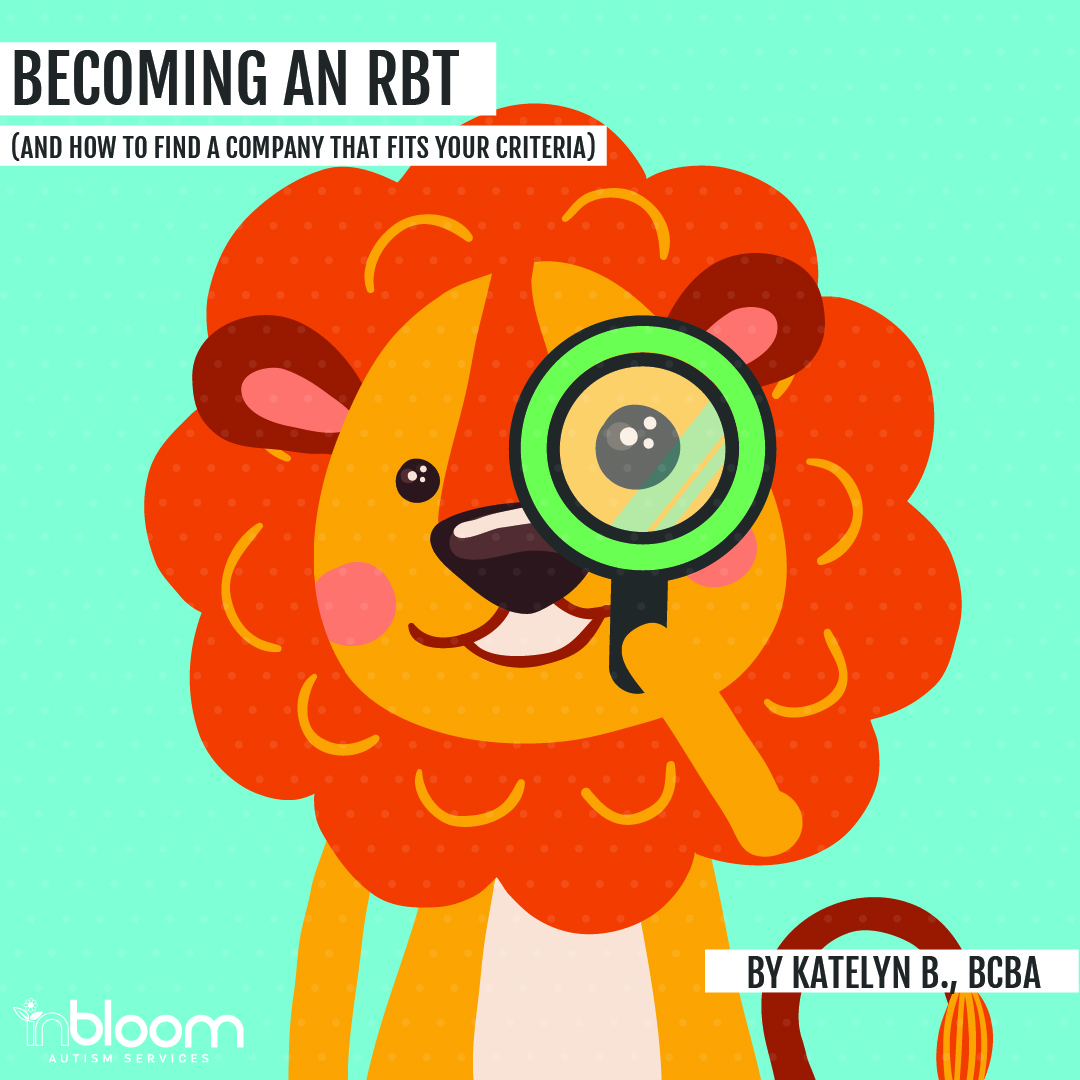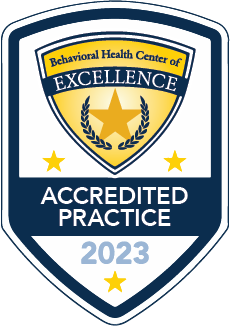Becoming an RBT

Close your eyes, think of your dream job. If it’s anything like mine, it’s a highly
rewarding one! My days for the last 3 years have included teaching kiddos with developmental delays how to communicate, use eating utensils, sit for story time, play with toys, write their names, play with peers, and much more! I work in the field of Applied Behavior Analysis (ABA), and from January 2016 until November 2019, I worked as a Registered Behavior Technician (RBT). This means I worked 1-on-1 with my kiddos, conducting direct ABA therapy. I have spent days lounging at the pool teaching safety skills such as walking, wearing pool floaties, and playing a game of marco polo with peers and I have also spent days teaching parents how to react to maladaptive behaviors, such as spitting or engaging in a tantrum. I did all of this with a list of specific objectives in mind which were created by an overseer–– a Board Certified Behavior Analyst (BCBA). The BCBA would create a plan and train me so I could comfortably and confidently teach the skills to my kiddo.
The field of ABA is ever-growing and morphing––and with the rise of awareness for Autism Spectrum Disorders (ASD), it makes for a very exciting time in the field of ABA!
This all sounds pretty cool, but let’s talk numbers. Why is this a good career field?
The field of ABA is ever-growing and morphing––and with the rise of awareness for
Autism Spectrum Disorders (ASD), it makes for a very exciting time in the field of ABA! With
more than 100,000 people currently holding a certification from the Behavior Analyst
Certification Board (BACB), it’s a very exciting time for us! For perspective, in 1999 there were a mere 28 individuals certified through the BACB to practice in the field of ABA. But with growth comes opportunity!
Remember how I mentioned earlier that I was an RBT until November of 2019? Well,
that’s because I’ve transitioned into the role of a BCBA! I started out as an RBT after graduating college, fell in love with the field, and decided I wanted to become a BCBA! There are so many paths you can walk down as an RBT. You can train to become a BCBA, like I did. You can train to become a BCaBA (Board Certified Assistant Behavior Analyst), you can become a training manager for many companies, or you can keep providing direct 1-on-1 care!
Okay, this all sounds great to me. Now how do I become an RBT?
Well, my colleague has already answered that for you! Take a moment to read that, and
then pop back over here.
Got all that? Good––glad you’re back!
So, let’s say that you’re suddenly a certified RBT. Now that you have all of this new
knowledge and skills––where do you go to apply them? What would you look for in a company?
When your employer can help you, you can help your clients!
As with any field, there are some employers who are better than others and some
features or characteristics to seek out, and others to avoid. This is an important step because,
when your employer can help you, you can help your clients!
With all that said, now we’re going to break down some of the features to look for in the
different types of places you could work. Some of us work in a clinic, others work directly in our clients’ homes. Some may spend a significant time out in the community (that’s right, we get to work with our super awesome kiddos AND hang out in Target!). There are also places where RBTs may work in a school. Ok, so we’re pretty much everywhere! Here are a few general things to look for, and some to avoid.
General tips:
- Organizational Behavioral Management: There is a subfield of Applied Behavior Analysis called Organization Behavioral Management, or OBM for short. This subfield helps drive the symbiotic relationship of an employee and a company and keeps employees motivated. While it’s a path in this field all on its own, check to see if your company uses the very principles it preaches within its own organization.
- Support: According to the BACB, an RBT should be supervised by a BCBA at a minimum of 5% of their total hours per client, ideally 10%. You should ask the company how often the BCBA will overlap for sessions with your clients, and other ways in which you would receive feedback and support.
- Make the Support Count: We also need to account for flexibility. Sometimes RBTs need their BCBA to come and observe a behavior or answer some challenging questions from the family. In order to keep therapy as beneficial as possible, it’s best to ensure that the BCBA in question has a flexible schedule for when these things come up. This way you can make the best out of supervision time!
- Compensation During Supervision: I have heard of some employers who doc an RBT’s pay during supervision. Watch out for a company who has this requirement. Part of the BCBA’s job is to supervise and make program modifications. Just because someone is doing their job, it doesn’t mean that you are doing your job any less. Make sure a company is always respecting your value and time as an RBT, as well as your hard work. This can be especially important during those times when a kiddo is having a rough session and the BCBA needs to be there to provide extra support.
- Additional Training: This is such a diverse field and it’s very important that necessary additional training be provided when needed. Ask about the client base and what kind of extra training will be needed. These training courses or seminars can be on subjects like CPR, Safety Care/Professional Crisis Management, or even alternative systems used for notes and data collection. If training is needed, be sure to ask when this is provided, that way you can safely and confidently do your job!
For Students:
Looking for supervision hours towards your BCBA or BCaBA? I’ve been there too! You’re
working really hard and should ensure you’re spending your time wisely. These are some
additional things to look for:
- “Do you offer student supervision towards my desired certification?” This may seem like a no-brainer, but it’s always best to ask just to make sure you’re setting the expectation that you are looking to gain those hours through the company!
- “How soon can I start collecting the hours?” Make sure you ask when your employer will start signing off on your hours. Some employers will start right away, and others may wait for a brief period to ensure everyone is a good fit for each other.
- Contracts: Ask questions about what may or may not be expected of you after you have collected your hours and earned your certification. Some employers may require you to sign a contract of you agreeing to stay with them for a certain period of time after gaining certification.
References:
Behavior Analyst Certification Board. (n.d). BACB certificant data. Retrieved from https://www.bacb.com/BACB-certificant-data


